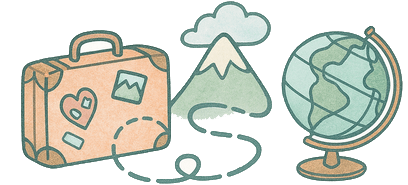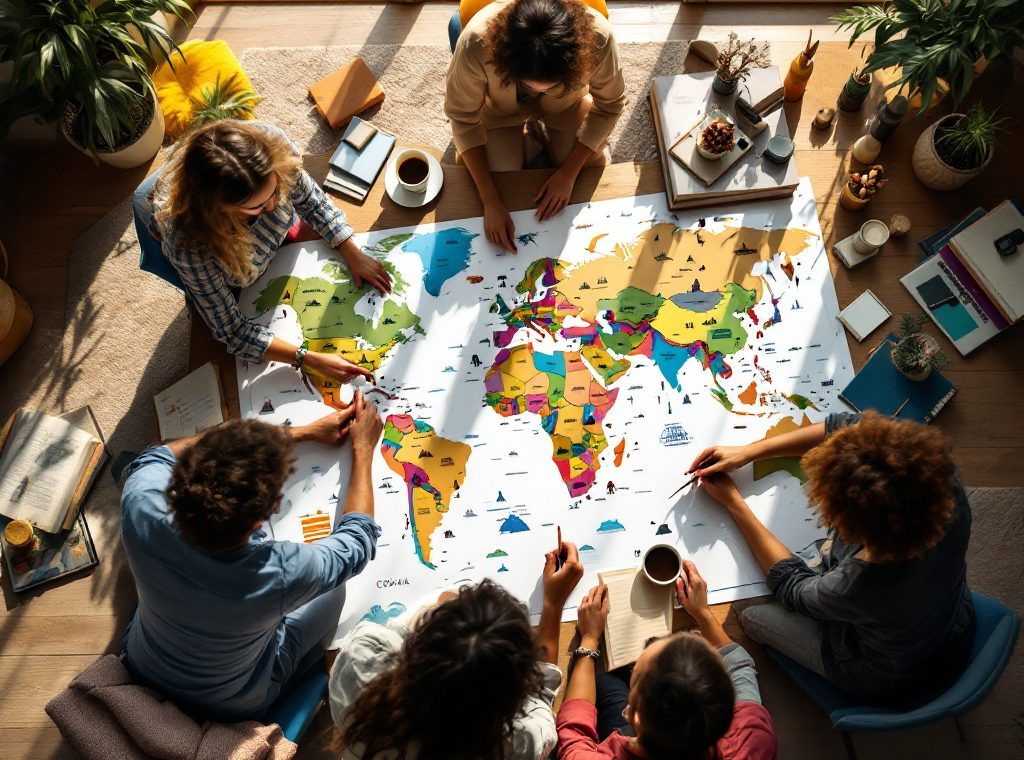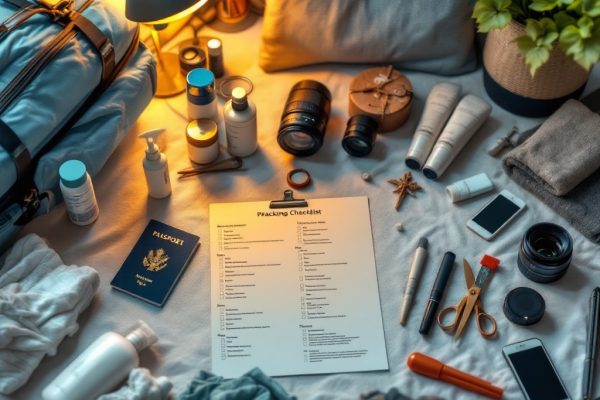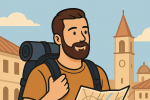First-Time Travelers: How to Plan a Trip for Beginners Like a Pro
Dreaming of your first adventure? Transform travel anxiety into excitement! This guide provides a step-by-step trip planning framework, from setting a budget and securing visas to packing light and staying safe. Learn how to craft the perfect itinerary, uncover hidden gems, and navigate the unexpected. Start planning your unforgettable journey today!
Important information
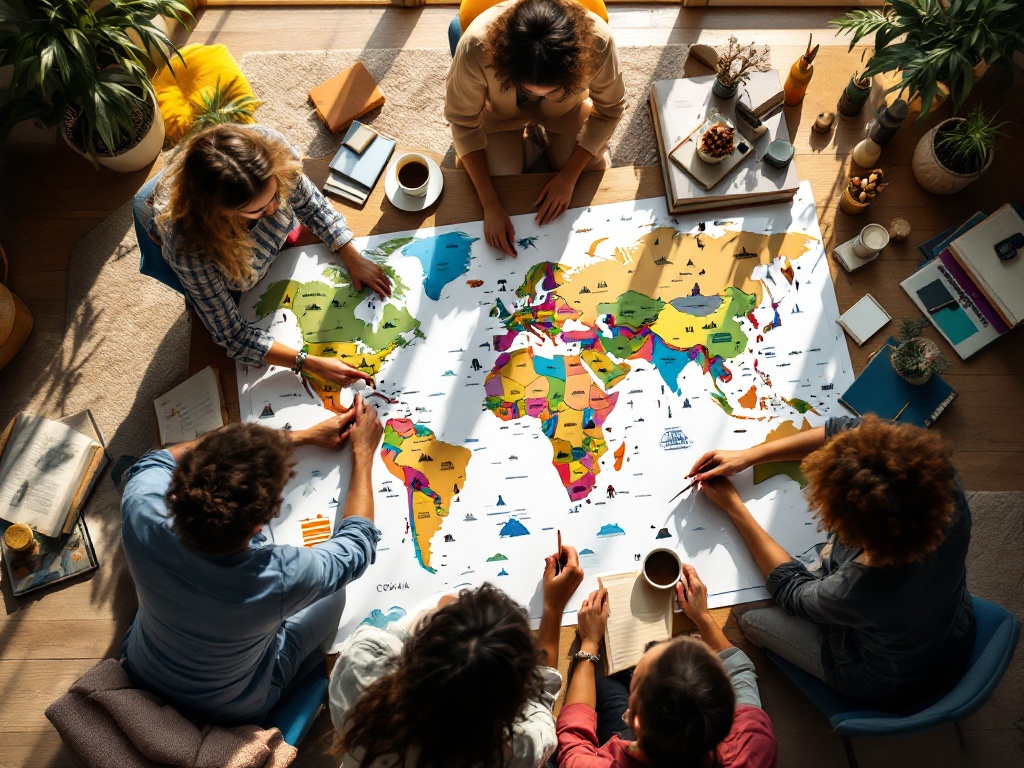
- Research your destination: Learn about local customs, attractions, visa requirements, and the climate.
- Set a realistic budget: Plan for travel, lodging, activities, food, and a contingency fund for unexpected costs.
- Create a flexible itinerary: Include must-see attractions and activities but allow room for spontaneity.
- Book flights and accommodations in advance: Especially during peak season, for better prices and availability. Consider travel insurance for unforeseen events.
- Pack light and smart: Bring essential documents, medications, and versatile clothing. Use packing cubes to organize and save space.
Understanding the Basics of Trip Planning for First-Time Travelers
Planning your first trip can be daunting, but it doesn’t have to be. Follow these steps to make your first trip unforgettable:
Research your destination and establish a budget. Begin by exploring potential destinations that pique your interest. Once you’ve chosen a location, determine a realistic budget that encompasses travel, accommodation, activities, and food.
Sketch out a possible itinerary. Outline a flexible itinerary that includes must-see attractions, activities, and potential day trips. This will give your trip structure while allowing room for spontaneity.
Determine your trip’s duration and investigate any necessary visas. Decide on the length of your stay and research visa requirements based on your nationality and destination. Apply for any necessary visas well in advance.
Research local customs and the climate. Familiarize yourself with the local customs and traditions to ensure a respectful and enriching experience. Check the climate and pack accordingly.
Book flights and accommodations. Secure your flights and accommodations in advance, especially during peak season, to benefit from better prices and availability.
Consider travel insurance. Protect yourself against unforeseen circumstances by purchasing comprehensive travel insurance. This can cover medical emergencies, lost luggage, and trip cancellations.
Alert your bank of your travel dates. Notify your bank and credit card companies of your travel dates and destinations to prevent any issues with your cards being blocked for suspicious activity.
Pack light. Pack only essential items to avoid excess baggage fees and the hassle of carrying heavy luggage. You can always purchase necessities at your destination.
What are the Essential Steps in Planning a Trip?
Determine your budget and how much you can spend.
Choose your destination, travel dates, and length of stay.
Research local customs, attractions, and visa requirements at your destination.
Book your flights and accommodations.
Create a detailed daily itinerary.
Pack essential documents like your passport and any necessary medications.
Consider travel insurance for unforeseen events.
Notify your bank of your travel plans.
Learn basic local phrases.
Locate emergency contact information.
How to Overcome Nervousness When Planning Your First Trip
Carefully plan your trip to avoid pre-trip jitters. Research your destination thoroughly, including local customs and transportation options.
Create a detailed itinerary. This will help you stay organized and make the most of your trip.
Seek advice from experienced travelers. Online communities can provide invaluable support and insights.
Be adaptable. Unforeseen events can occur, so embrace flexibility for a smooth and enjoyable journey.
Setting Your Travel Budget: A Comprehensive Guide
Planning your travel budget effectively is crucial for a successful trip. Start by researching typical prices for flights, accommodation, meals, activities, transportation, and souvenirs at your destination. This will help you create a realistic budget and identify potential savings opportunities. Before choosing your destination, especially if you’re on a tight budget, set a clear spending limit to ensure affordability. Estimate essential expenses, including flights and lodging, but don’t forget about daily costs such as meals, activities, transportation, and souvenirs. Set a daily spending limit to stay on track and create a contingency fund for unexpected expenses. Utilize budgeting apps or spreadsheets to simplify expense tracking and manage your finances effectively. A well-planned budget enables you to prioritize desired splurges and fully enjoy your travels.
How to Plan Your Budget Carefully for Travel Expenses
Planning a trip requires careful budgeting. Research flights, accommodation, meals, and activities to estimate costs at your destination. Creating a realistic budget with a daily spending limit is crucial. Remember to include a contingency fund for unexpected expenses. Use budgeting apps or spreadsheets to track spending effectively.
Calculate your daily allowance by dividing your total budget by the trip length. This should cover essentials like accommodation, food, activities, and transport.
If you’re on a tight budget, determine it first. Then, select a destination that aligns with your finances. This ensures your trip is financially feasible.
Leverage travel rewards programs to potentially reduce costs significantly.
Selecting Your Destination: Research and Familiarization
Planning your next trip involves several key steps. First, identify your passions and what truly excites you. Next, balance your budget with your available travel time. Consider your travel style: are you a thrill-seeker or someone who prefers relaxation? This will help determine your ideal destination. Practical aspects are also crucial: prioritize safety, check visa requirements, and research local customs. Remember to account for seasonal variations.
Destination Research
Once you’ve chosen a location, thorough research is essential. Consult travel guides for expert insights, explore blogs and vlogs for authentic experiences, and visit official tourism websites for valuable information.
Cultural Preparation
Learning basic local phrases can enhance your trip. Understanding the currency exchange rate is crucial for budgeting. Familiarize yourself with cultural nuances for smoother interactions.
Logistics and Safety
Explore maps and transport options for efficient navigation. Review local laws and regulations for a hassle-free experience. Ensure you have necessary travel insurance and emergency contacts.
Practical Tips
Pack appropriate clothing and essentials. Notify your bank and phone provider of your travel dates. Make copies of important documents like your passport and visa.
What are the Key Factors in Destination Selection?
Planning your dream getaway? Safety should be your top priority. Thoroughly research crime statistics and any political instability at your destination. Pay attention to visa requirements, as they vary based on your citizenship and destination. A realistic budget is essential, covering flights, accommodation, activities, and meals. Consider your interests. History buff? Rome might be your perfect match. Prefer beach relaxation? Bali beckons. If vibrant nightlife is your scene, Ibiza could be ideal. Balance your passions with practicalities like safety and budget.
Prioritize Safety
Thoroughly research crime statistics and political stability at your destination.
Check visa requirements based on your citizenship.
Budget Wisely
Create a realistic budget encompassing flights, accommodation, activities, and meals.
Match Your Interests
History buff? Rome might be your perfect match.
Prefer beach relaxation? Bali beckons.
Looking for vibrant nightlife? Ibiza could be ideal.
Balance Passions with Practicalities
Remember to balance your passions with practicalities like safety and budget.
How to Familiarize Yourself with Your Chosen Destination
Immerse yourself in the local culture by researching traditions and etiquette. This demonstrates respect for the community and enriches your travel experience.
Prioritize safety by reviewing guidelines, health advisories, and security concerns specific to your destination.
Learn basic local phrases. This not only facilitates communication but also expresses cultural appreciation.
Leverage resources like guidebooks, travel blogs, vlogs, and official tourism websites to discover local attractions and transportation options.
Familiarize yourself with cultural norms to ensure smooth and respectful interactions.
Travel Documentation and Visa Requirements
Passport Validity: Ensure your passport’s validity extends six months beyond your planned return date.
Visa Requirements: Research the specific visa requirements for your nationality and destination. Some countries require visas in advance, some issue them upon arrival, and others may not require a visa at all.
Advance Visa Application: If your destination requires a visa, apply well in advance to allow sufficient processing time.
Document Safeguarding: Safeguard crucial documents like your passport, visa, driver’s license, and travel insurance by keeping both physical and digital copies stored separately. This protects you against loss or theft.
How to Handle Important Documents and Passport Validity
Scan crucial documents like your passport, visa, driver’s license, and travel insurance. Store these copies separately from the originals for added security.
Confirm your passport’s validity extends at least six months beyond your return date. This is a common entry requirement for many countries and this precaution can prevent unexpected travel disruptions.
Why is it Important to Check Visa Requirements?
Planning your trip? Don’t let visa issues derail your adventure. Check visa requirements early to avoid travel headaches. While some countries offer visa-free travel or visas upon arrival based on your nationality, many require a valid visa for entry. Research your destination’s specific visa policy, as requirements, necessary documents, fees, and processing times can differ significantly. Failing to comply with visa rules can lead to denied entry or frustrating delays, so plan ahead for a smooth and hassle-free trip.
Booking Essentials: Flights, Accommodation, and Transportation
Planning your trip efficiently involves streamlining several key aspects. First, compare flight prices across different airlines and booking platforms to secure the best deals. Factor in baggage allowances and flight times for a smoother experience. Second, find the perfect accommodation by considering location, amenities, and budget. Explore various options online, from hotels and hostels to vacation rentals. Third, research transportation options. Renting a car offers flexibility, while public transport is often more economical. Choose the best option based on your itinerary and destination.
How to Book Flights Efficiently
To grab the best flight deals, explore various websites and consider flights with layovers. Flexibility with your travel dates is key. Tools like Google Flights and price tracking apps can help you pinpoint bargains. Traveling during shoulder seasons, such as spring or fall, often yields lower prices and significant savings.
Find the Cheapest Flights
- explore various websites,
- consider flights with layovers,
- be flexible with your travel dates.
Tools and Tips
- use Google Flights and price tracking apps,
- travel during shoulder seasons (spring or fall).
What Considerations are Important for Accommodation Reservation?
Prioritize location when booking accommodations. Choose a spot convenient to attractions and transportation.
Establish a budget and stick to it. Stay within your spending limits.
Consider essential amenities. Look for accommodations that offer Wi-Fi, breakfast, and parking to enhance your stay.
Review the cancellation policy. Understanding the cancellation policy is crucial in case your travel plans change unexpectedly.
Should You Rent a Car or Use Public Transportation?
A rental car offers freedom and flexibility, particularly for venturing into remote areas.
Public transportation is typically more economical and often faster in cities with well-developed transit systems.
By weighing your needs and destination, you can determine the ideal travel solution.
Creating an Effective Travel Itinerary
Crafting an unforgettable trip starts with a well-structured itinerary, maximizing your time and ensuring you experience everything you desire.
Research your destination thoroughly, exploring key attractions, enticing restaurants, and exciting activities.
Estimate the duration of each activity, factoring in travel time.
Optimize your sightseeing by clustering nearby attractions and consider booking accommodation in close proximity.
Incorporate relaxation time into your schedule.
Personalize your itinerary based on your interests and travel style.
A thoughtfully planned itinerary avoids a jam-packed schedule, promising a balanced and enjoyable travel experience.
How to Organize Your Travel Itinerary Like a Pro
Schedule your activities with specific times and locations, adding buffer time for unexpected delays.
Group activities in the same area to minimize travel time.
Prioritize essential tasks and be flexible with less important ones.
Include downtime for relaxation and exploration.
Use a planner, whether digital or physical, to stay organized.
Packing Like a Pro: Essentials for First-Time Travelers
Traveling light enhances your journey. Consider these packing tips for a smoother trip:
Clothing
Select adaptable clothing items that can be layered strategically. This allows you to adjust to changing weather conditions and pack lighter overall.
Essentials
- Create a packing list to avoid leaving behind crucial travel documents and medications.
- Remember chargers for your electronic devices and a basic first-aid kit.
- Consider the destination’s climate and planned activities when choosing what to pack.
Keep in mind that most places have shops where you can purchase any forgotten necessities.
First-Time Adventurer Essentials
Ensure you have your passport, tickets, and weather-appropriate clothing. Pack toiletries, any necessary medications, electronic devices, and chargers.
Health and Hydration
A first-aid kit and a reusable water bottle are vital for your well-being. Pack some snacks and a portable charger for added convenience.
Smart Packing Tips
Include a first-aid kit, daily medications, and a journal to document your experiences. Keep both physical and digital copies of important documents.
Practical Items
Practical items like a microfiber towel, duct tape, and a battery pack can be invaluable on your trip. Choose quick-drying synthetic clothing and waterproof your backpack to protect your belongings.
How to Pack Light and Efficiently
Pack versatile clothing items like a neutral cardigan that can elevate an outfit or provide warmth.
Maximize luggage space with travel-sized toiletries and packing cubes to compress and organize clothing.
Roll your clothes instead of folding to save space.
Stay hydrated with a reusable water bottle.
Pack a small first-aid kit for emergencies.
Avoid overpacking by leaving unnecessary items at home.
Create a packing list and check off items as you pack to stay organized.
What are the Must-Have Packing Essentials and Equipment?
Pack these essential items for your next adventure:
- Sturdy backpack, to carry all your essentials.
- Comfortable walking shoes, vital for exploring new terrains.
- Travel journal, to document your unique experiences.
- First-aid kit, crucial for handling unexpected situations.
- Reusable water bottle, to stay hydrated on the go.
- Portable charger or battery pack, to keep your electronic devices powered up.
- Lightweight, quick-drying microfiber towel, a smart and efficient choice.
- Digital and physical copies of important documents, for safety and accessibility.
- Necessary medications, to maintain your health throughout your travels.
- Chargers for your devices, to avoid running out of power.
Travel Insurance and Safety Tips
Planning your first international trip? Travel insurance and safety awareness are essential. Travel insurance protects you from unexpected costs, from medical emergencies and trip cancellations to lost luggage. Being safety-conscious lets you avoid potential problems and enjoy your travels more.
Why Travel Insurance Matters
Travel insurance offers crucial financial protection against unforeseen events. These can include: medical emergencies, trip cancellations, and lost baggage. This peace of mind is especially valuable in unfamiliar places.
Safety Tips for First-Time Travelers
- research local laws and customs.
- Be aware of your surroundings.
- Keep copies of important documents and emergency contacts accessible.
- Use reputable transportation and accommodation.
- Avoid displaying expensive items.
- Trust your instincts.
- Regularly check in with someone back home.
These precautions will contribute to a safer and more enjoyable trip.
Why is Purchasing Travel Insurance Crucial?
Travel insurance offers crucial protection against unexpected travel disruptions. It covers trip cancellations and interruptions, medical emergencies abroad (including evacuations), and lost or stolen luggage. This comprehensive coverage provides financial security and peace of mind, especially for first-time international travelers. Navigating unfamiliar territories can be daunting, but travel insurance helps alleviate those concerns. Here’s a breakdown of key benefits:
- Trip Cancellation/Interruption: Reimbursement for prepaid, non-refundable trip expenses if canceled or interrupted due to covered reasons, such as illness or severe weather.
- Medical Emergencies Abroad: Coverage for medical expenses incurred while traveling, including doctor visits, hospital stays, and emergency medical transportation.
- Lost/Stolen Luggage: Reimbursement for lost, stolen, or damaged baggage and personal belongings.
- Emergency Evacuation: Coverage for the cost of emergency medical evacuation to the nearest appropriate medical facility or back home.
- 24/7 Assistance: Access to multilingual assistance services for travel-related emergencies, such as lost passports or travel documents.
Having travel insurance offers peace of mind, allowing you to focus on enjoying your trip.
What are the Top Safety Tips for First-Time Travelers?
Research local laws and customs before your trip to ensure a smoother experience.
Be aware of your surroundings and avoid displaying expensive items like jewelry or electronics.
Securely store copies of important documents and keep emergency contacts readily available.
Opt for reputable transportation and accommodations.
Stay connected with family or friends back home.
Trust your instincts; if a situation feels unsafe, remove yourself.
Enhancing Your Travel Experience with Tips and Tricks
Traveling stress-free is within your reach with these helpful tips. Connect with fellow travelers online. Blogs, forums, and social media groups provide a wealth of information from seasoned explorers. Master the art of packing light. Packing cubes and compression bags maximize luggage space. A portable charger is essential for keeping your devices powered up. Offline maps and translation apps are invaluable, especially in areas with limited internet access. Learning basic local phrases improves communication and shows respect.
Save money on your trip
- pack a reusable water bottle,
- bring your own snacks,
- use flight comparison websites,
- consider budget airlines.
Ensure a smooth and secure journey
- alert your bank and phone provider of your travel dates,
- photocopy important documents,
- keep copies separate from originals,
- seek out free activities like walking tours and exploring local parks.
Engage with the online travel community. Share experiences, seek advice, and discover hidden gems from fellow adventurers.
Pack smart and light. Utilize packing cubes and compression bags to maximize luggage space, ensuring you have everything you need without the extra weight.
Stay connected and informed. A portable charger keeps your devices powered up, while offline maps and translation apps prove invaluable, especially in areas with limited internet access.
Embrace the local culture. Learning basic local phrases enhances communication and demonstrates respect, enriching your travel experience.
Plan for a secure trip. Alert your bank and phone provider of your travel dates to avoid any issues. Photocopy important documents and store them separately from the originals for added security.
Uncover budget-friendly options. Utilize flight comparison websites and consider budget airlines to find the best deals. Seek out free activities such as walking tours and exploring local parks, adding value to your trip without breaking the bank.
Remember to account for travel time. Travel smart and savor your journey.
What are Some Useful Travel Hacks and Resources?
Streamline your travels with helpful apps for managing itineraries and booking flights and hotels.
Snag discounts using price comparison websites.
Pack efficiently with packing cubes to organize your luggage.
For extra
